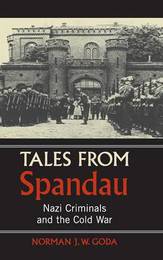
|
Tales from Spandau: Nazi Criminals and the Cold War
Hardback
Main Details
Description
Sentenced to long prison sentences at the Trial of the Major War Criminals at Nuremberg, seven of Adolf Hitler's closest associates - Rudolf Hess, Albert Speer, Karl Doenitz, Erich Raeder, Walther Funk, Konstantin von Neurath, and Baldur von Schirach - were to have become forgotten men at Berlin's Spandau Prison. Instead they became the focus of a bitter four decade tug-of-war between the Soviet Union and the Western Allies - a dispute on the fault line of the Cold War itself which drew in heads-of-state, military strategists, powerful businessmen, vocal church leaders, old-world aristocrats, international spies, and neo-Nazis. Drawing on long-secret records from four countries, Norman J. W. Goda provides an exciting new perspective on the terrifying shadow thrown by Nazi Germany on the Cold War years, and how that shadow helped to influence the Cold War itself.
Author Biography
Norman J. W. Goda is a Professor of History at Ohio University. He is the author of Tomorrow the World: Hitler, Northwest Africa and the Path to America and co-author of U.S. Intelligence and the Nazis.
Reviews"In Tales from Spandau Norman Goda demonstrates convincingly that the conditions of punishment at Spandau Prison for those convicted at the International Military Tribunal at Nuremberg had inevitable and divisive political repercussions. Supported by diligent research and imagination, Goda's work casts new light on diverse issues such as the Nuremberg trial, memory of the Nazi regime, and even the Cold War. It is also a fine read." -Richard Breitman, American University "Norman Goda's Tales from Spandau demonstrates what those of us who have followed his work for some time have already known: he is one of the very finest historians of Germany now in the midst of their careers in this country and around the world. His accomplishment in this book is a remarkable combination of detailed detective work in many archives, intriguing anecdotes, acute political analysis, cogent historical arguments about the trial and punishment of Nazi war criminals and a firm, subtle, sophisticated yet passionate moral compass. The much overused term "great" applies to Goda and to this very fine work. It should be required reading for anyone who takes a serious interest in the intersection of Cold War politics with the confrontation with the Nazi past in Germany." -Jeffrey Herf, University of Maryland "Despite all that has been written about Nuremberg, Norman Goda has come up with an original idea and has carried it through splendidly. Tales from Spandau looks at the intersection between the Allies' conviction of the major German war criminals and the emerging confrontation between the Soviets and the western powers. Most books examine Nuremberg retrospectively, looking back to the origins of the trial. Instead, Goda looks forward, showing how much the postwar fate of the condemned Nazi leadership, as well as the memory of their criminality, depended on the complex, charged interactions of East and West. Engagingly written, this is intelligent, informative, and imaginative history. I recommend it not only as a new examination of Nuremberg, but as a warning for those engaged in present and future reckoning with war criminals." -Michael R. Marrus, University of Toronto and author of The Holocaust in History "[a] splendid study[...] It can be enjoyed by and useful to anyone interested in World War II history, Cold War history or German history generally." -Chicago Sun-Times "[...]the work is richly and densely documented. Goda impresses with an eye for detail... Goda weaves the actions of diplomats, doctors, prisoners, their families, and guards into a story that is part Cold War politics and part the memory and legacy of Nazism. Equally commendable is Goda's ability to write objectively about the conditions at the prison and the degree to which the inmates were pawns of both domestic and foreign relations without ever lapsing into sympathy for justifiably condemned men. Lengthy chapters demolish Albert Speer and Rudolf Hess, respectively." -Jay Lockenour, Temple University, H-German "As Norman Goda makes clear in his absorbing and sometimes eloquent Tales From Spandau, the Western Allies often disagreed over what to do with the prisoners, how to handle their medical needs as they grew older and even how to arrange burial if one were to die in prison[...] The book's most compelling sections involve Speer and Hess. With painstaking research and a reliable moral compass, Mr. Goda shows how Speer began, from the outset of his imprisonment, to 'rehabilitate' himself, angling for an early release from his 20-year sentence." -Wall Street Journal "This is a masterpiece of sophisticated historical analysis on the intersections among legal history[...], Cold War diplomatic history[...], and the politics of contested memories in postwar Germany." -Gunter Bischof, University of New Orleans, American History Review "Centered on the incarceration of seven major Nazi leaders, [...], Goda has deftly woven their personal and political histories into a larger cold war history of considerable substance. [...] With this book, Goda has taken his place not only as a leading scholar of the Third Reich's afterlife, but also as a[n] historian of international justice and retribution." -Carole K. Fink, Ohio State University, The International History Review
|